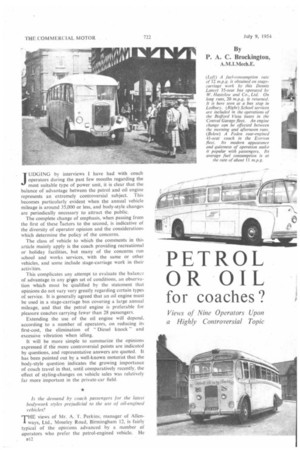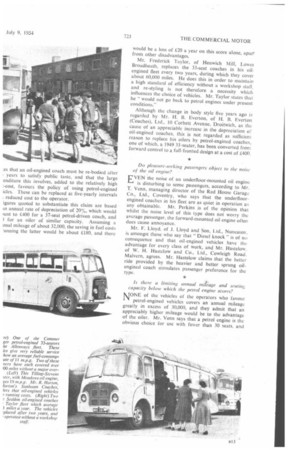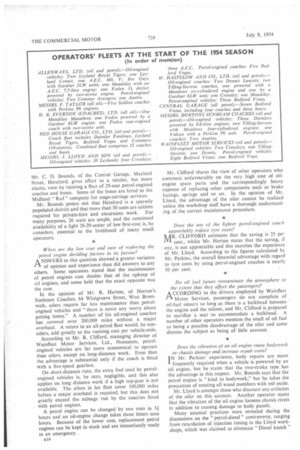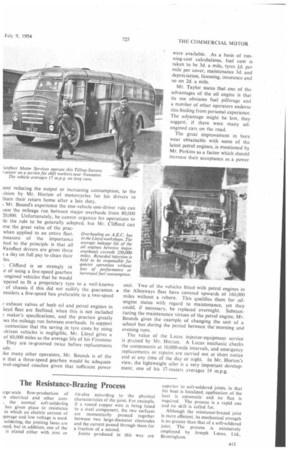PETROL OR OIL
Page 46

Page 47

Page 48

Page 49

If you've noticed an error in this article please click here to report it so we can fix it.
for coaches ?
Views of Nine Operators Upon a Highly Controversial Topic
By
P. A. C. Brockington, A.M.I.Mech.E.
JUDGING by interviews I have had with coach operators during the past few months regarding the most suitable type of power unit, it is clear that the balance of advantage between the petrol and oil engine represents an extremely controversial subject. This becomes particularly evident when the annual vehicle mileage is around 35,000 or less, and body-style changes are periodically necessary to attract the public.
The complete change of emphasis, when passing from the first of these factors to the second, is indicative of the diversity of operator opinion and the considerations which determine the policy of the concerns.
The class of vehicle to which the comments in this article mainly apply is the coach providing recreational or holiday facilities, but many of the concerns run school and works services, with the same or other vehicles, and some include stage-carriage work in their activities.
This complicates any attempt to evaluate the balance of advantage in any gin set of conditions, an observation which must be qualified by the statement that opinions do not vary very greatly regarding certain types of service. It is generally agreed that an oil engine must be used in a stage-carriage bus covering a large annual mileage, and that the petrol engine is preferable for pleasure coaches carrying fewer than 28 passengers.
Extending the use of the oil engine will depend, according to a number of operators, on reducing its first-cost, the elimination of " Diesel knock " and excessive vibration when idling.
It will be more simple to summarize the opinions expressed if the more controversial points are indicated by questions, and representative answers are quoted. It has been pointed out by a well-known motorist that the body-style question indicates the growing importance of coach travel in that, until comparatively recently, the effect of styling-changes on vehicle sales was relatively far more important in the private-car field.
Is the demand by coach passengers for the latest bodywork styles prejudicial to the use of oil-engined vehicles?
THE views of Mr. A. T. Perkins; manager of Allen' ways, Ltd., Moseley Road, Birmingham 12, is fairly typical of the opinions advanced by a number of operators who prefer the petrol-engined vehicle. He 812 es that an oil-engined coach must be re-bodied after years to satisfy public taste, and that the large enditure this involves, added to the relatively high :-cost, favours the policy of using petrol-engined ides. These can be replaced at five-yearly intervals . reduced cost to the operator.
igures quoted to substantiate this claim are based in annual rate of depreciation of 20%, which would punt to £400 for a 37-seat petrol-driven coach, and ) for an oiler of similar capacity_ Assuming a onal mileage of about 32,000, the saving in fuel costs .unning the latter would be about £180, and there
would be a loss of £20 a year on this score alone, apart from other disadvantages.
Mr. Frederick Taylor, of Henwieh Mill, LOWC1 Broadheath, replaces the 33-seat coaches in his oilengined fleet every two years, during which they covet about 60,000 miles. He does this in order to maintain a high standard of efficiency without a workshop staff, and re-styling is not therefore a necessity which influences the choice of vehicles. Mr. Taylor states that he "would not go back to petrol engines under present conditions."
Although the change in body style five years ago is regarded by Mr. H. B. Everton, of H. B. Everton (Coaches), Ltd., 10 Corbett Avenue, Droitwich, as the cause of an appreciable increase in the depreciation of oil-engined coaches, this is not regarded as sufficient reason to replace his oilers by petrol-engined coaches, one of which, a 1949 33-seater, has been converted from forward control to a full-fronted design at a cost of £400.
Do pleasure-seeking passengers object to the noise of the oil engine?
EVEN the noise of an underfloor-mounted oil engine
is disturbing to some passengers, according to Mr. T. Venn, managing director of the Red House Garag:: Co., Ltd., Coventry, who says that the underfloor-. engined coaches in his fleet are as quiet in operation as any obtainable. Mr. Perkins is of the opinion that whilst the noise level of this type does not worry the average passenger, the forward-mounted oil engine often does cause annoyance.
Mr. F. Lloyd, of J. Lloyd and Son, Ltd., Nuneaton. is amongst those who say that "Diesel knock" is of no consequence and that oil-engined vehicles have the advantage for every class of work, and Mr. Hastelow. of W. H. Hastelow and Co., Ltd., Cowleigh Road. Malvern, agrees. Mr. Hastelow claims that the better ride provided by the heavier and better sprung oilengined coach stimulates passenger preference for the type.
Is there a limiting annual mi cage and seating capacity below which the petrol engine scores?
MONE of the vehicles of the operators who favour " petrol-engined vehicles covers an annual mileage greatly in excess of 30,000, and they admit that an appreciably higher mileage would be to the advantage of the oiler. Mr. Venn says that a petrol engine is the obvious choice for use with fewer than 30 seats, and
Mr. C. D. Bounds, of the Central Garage, Maylord Street, Hereford, gives effect to a similar, but more elastic, view by running a fleet of 29-seat petrol-engined coaches and buses. Some of the buses are hired to the Midland " Red " company for stage-carriage services.
Mr. Bounds points out that Hereford is a sparsely populated district and that more than 30 seats are seldom required for private-hire and excursions work. For many purposes, 26 seats are ample, and the continued availability of a light 26-29-seater of low first-cost is, he considers, essential to the livelihood of many small operators.
When are the low cost and ease of replacing the petrol engine deciding factors in its favour?
A NSWERS to this question showed a greater variance
of opinion and experience than did answers to any others. Some operators stated that the maintenance of petrol engines cost double that of the upkeep of oil engines, and some held that the exact opposite was the case.
In the opinion of Mr. R. Horton, of Horton's Sunbeam Coaches, 64 Whitgreave Street, West Bromwich, oilers require far less maintenance than petrolengined vehicles and "there is never any worry about getting home." A number of his oil-engined coaches has covered over 200,000 miles without a major overhaul. A return to an all-petrol fleet would, he considers, add greatly to the running cost per vehicle-mile.
According to Mr. R. Clifford, managing director of Wainfleet Motor Services, Ltd., Nuneaton, petrolengined vehicles are far more economical to operate than oilers, except on long-distance work. Even then the advantage is substantial only if the coach is fitted with a five-speed gearbox.
On short-distance runs, the extra fuel used by petrolengined vehicles is, he says, negligible, and this also applies on long distance work if a high top-gear is not available. The oilers in his fleet cover 100,000 miles before a major overhaul is required, but this does not greatly exceed the mileage run by the coaches fitted with petrol engines.
A petrol engine can be changed by one man in 3i hours and an oil-engine change takes three fitters nine hours. Because of the lower cost, replacement petrol engines can be kept in stock and are immediately ready in an emergency. Mr. Clifford shares the view of other operators who comment unfavourably on the very high cost of oilengine spare parts and the correspondingly heavy expense of replacing other components such as brake facings, springs and so on. In the opinion of Mr. Lloyd, the advantage of the oiler cannot be realized unless the workshop staff have a thorough understanding of the correct maintenance procedure.
Does the use of the lighter petrol-engined coach appreciably reduce tyre costs?
AAR. CLIFFORD estimates that the saving is 25 per "I cent, whilst Mr. Horton states that the saving, if any, is not appreciable and this matches the experience of Mr. Lloyd. According to the figures calculated by Mr. Perkins, the overall financial advantage with regard to tyre costs by using petrol-engined coaches is nearly 50 per cent.
Do oil fuel fumes contaminate the atmosphere to the extent that they affect the passengers?
CCORDING to the drivers employed by Wainfleet Motor Services, passengers do not complain of oil-fuel odours so long as there is a bulkhead between the engine and the saloon, and Mr. Clifford is prepared to sacrifice a seat -to accommodate a bulkhead. A number of other operators mention the smell of oil fuel as being a possible disadvantage of the oiler and some dismiss the subject as being of little account.
Does the vibration of an oil engine cause bodywork or chassis damage and increase repair costs?
IN Mr. Perkins' experience, body repairs are more A frequently required when a vehicle is powered by an oil engine, but he states that the two-stroke type has the advantage in this respect. Mr. Bounds says that the petrol engine is "kind to bodywork," but he takes the precaution of treating all wood members with red oxide.
Mr. Lloyd is amongst those who discount any criticism of the oiler on this account. Another operator states that the vibration of the oil engine loosens chassis rivets in addition to causing damage to body panels.
Many unusual practices were revealed during the discussions on the " petrol-diesel " controversy, ranging from retardation of injection timing in the Lloyd workshops, which was claimed to eliminate "Diesel knock" lout reducing the output or increasing consumption, to the rision by Mr. Horton of motorcycles for his drivers to litate their return home after a late duty.
-. Clifford is so strongly in ir of using a five-speed gearbox -engined vehicles that he would -epared to fit a proprietary type to a well-known of chassis if this did not nullify the guarantee. )nsiders a five-speed box preferable to a two-speed
; exhaust valves of both oil and petrol engines in loyd fleet are Stellited, when this is not included maker's specifications, and the practice greatly ses the mileage run between overhauls. In support contention that the saving in tyre costs by using -driven vehicles is negligible, Mr. Lloyd gives a of 60,000 miles as the average life of his Firestone They are re-grooved twice before replacements ade.
ike many other operators, Mr. Bounds is of the n that a three-speed gearbox would be adequate trol-engined coaches given that Sufficient power were available. As a basis of running-cost calculations, fuel cost is taken to be 3d. a mile, tyres id. per mile per cover, maintenance 3d, and depreciation, licensing, insurance and so on 2d. a mile.
Mr. Taylor states that one of the advantages of the oil engine is that its use obviates fuel pilferage and a number of other operators endorse this finding from personal experience. The advantage might be lost, they suggest, if there were many oilengined cars on the road.
The great improvement in bore wear obtainable with some of the latest petrol engines, is mentioned by Mr. Perkins as a factor which should increase their acceptance as a power unit. Two of the vehicles fitted with petrol engines in
• the Allenways fleet have covered upwards of 160,000 miles without a rebore. This qualifies them for oilengine status with regard to maintenance, yet they could, if necessary, be replaced overnight. Substantiating the maintenance virtues of the petrol engine, Mr. Bounds gives the example of changing the unit of a school bus during the period between the morning and evening runs.
The value of the Lucas injector-equipment service is praised by Mr. Horton. A Lucas mechanic checks the components at 10,000-mile intervals, and emergency replacements or repairs are carried out at short notice and at any time of the day or night. In Mr. Horton's view, the lightweight oiler is a very important development; one of his 37-seaters averages 19 m.p.g.




























































































